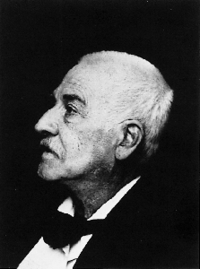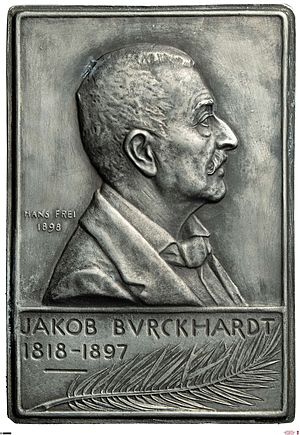Jacob Burckhardt facts for kids
Quick facts for kids
Jacob Burckhardt
|
|
|---|---|

Jacob Burckhardt in 1892
|
|
| Born | 25 May 1818 |
| Died | 8 August 1897 (aged 79) Basel, Switzerland
|
| Nationality | Swiss |
| Alma mater | University of Bonn |
|
Notable work
|
The Civilization of the Renaissance in Italy (Die Cultur der Renaissance in Italien; 1860) |
| School | History of art Cultural history |
| Institutions | University of Basel Federal Polytechnic School |
|
Influences
|
|
|
Influenced
|
|
Carl Jacob Christoph Burckhardt (born May 25, 1818 – died August 8, 1897) was a famous Swiss historian. He studied art and culture and helped shape how we understand these subjects today. He is known as one of the main people who started the field of cultural history.
A historian named Sigfried Giedion said that Burckhardt was a "great discoverer." He was the first to show how to study a whole historical period. This meant looking at its art, buildings, and even the daily lives of people. His most famous book is The Civilization of the Renaissance in Italy, published in 1860.
Contents
Jacob Burckhardt's Life Story
Jacob Burckhardt was born and died in Basel, Switzerland. His father was a Protestant church leader. Jacob first studied theology, hoping to become a clergyman. However, he changed his mind and decided not to join the church. He was part of the important Burckhardt family in Basel.
Early Studies and Teaching Career
In 1839, he finished his degree and went to the University of Berlin. There, he studied history, especially art history, which was a new field back then. He learned from Leopold von Ranke, who taught history based on facts and records.
In 1841, he studied at the University of Bonn with art historian Franz Theodor Kugler. Burckhardt dedicated his first book, Die Kunstwerke der belgischen Städte (1842), to Kugler.
Burckhardt taught at the University of Basel from 1843 to 1855. Then he taught at the Federal Polytechnic School. In 1858, he returned to Basel and became a professor. He taught there until he retired in 1893. From 1886, he focused only on teaching art history. He was offered professor jobs at German universities twice but turned them down.
After he passed away in 1898, a special medal was made to honor him. It was created by a Swiss engraver named Hans Frei. Burckhardt was also featured on the Swiss thousand franc banknote.
Burckhardt's Important Works
Jacob Burckhardt's writings showed how important art is when studying history. He is seen as one of the "founding fathers of art history." He also helped create the field of cultural history. He believed that art, literature, and architecture were key sources for understanding the past.
Burckhardt had a different way of looking at history. He didn't like the popular ideas of his time that tried to explain everything with one big theory. Instead, he focused on understanding different parts of society and culture.
Travel and Art Guides
In 1838, Burckhardt traveled to Italy for the first time. He published his first important article, "Remarks about Swiss Cathedrals." He also gave many lectures at the University of Basel. These lectures were later published as Force and Freedom: An Interpretation of History by Jacob Burckhardt.
In 1847, he helped update two major art history books by his teacher, Kugler. In 1853, Burckhardt published his own book, Die Zeit Constantins des Grossen ("The Age of Constantine the Great"). He spent a lot of time in Italy in 1853 and 1854. He was gathering information for his 1855 book, Der Cicerone: Eine Anleitung zum Genuss der Kunstwerke Italiens. This book was a guide for travelers to enjoy art in Italy. It covered sculpture, architecture, and painting. Many people called it the best travel guide ever written.
The Renaissance and Modernity
About half of Der Cicerone was about the art of the Renaissance. This led to his two most famous books. The first was his 1860 book, Die Cultur der Renaissance in Italien ("The Civilization of the Renaissance in Italy"). The second was his 1867 book, Geschichte der Renaissance in Italien ("The History of the Renaissance in Italy").
The Civilization of the Renaissance in Italy was very important in the 1800s. It is still read widely today. Burckhardt might have been the first historian to use the word "modernity" in a clear, academic way. He saw the Renaissance as a time when art, philosophy, and politics came together. He believed it helped create "modern man."
Burckhardt thought the Renaissance brought new forms of cultural and religious freedom. But he also worried about people feeling alone or disappointed in the modern world. His ideas were sometimes debated. However, many historians agree that his views on the Renaissance were correct. Burckhardt and another German historian, Georg Voigt, started the historical study of the Renaissance. Burckhardt looked at all parts of Renaissance society.
Other Historical Studies
Burckhardt believed that studying ancient history was very important. He was a respected expert on Greek civilization. His lectures on Greek culture were later put into a book called "The Greeks and Greek Civilization." He worked on a four-volume study of Greek civilization before he died.
His book "Judgments on History and Historians" is based on his lectures at the University of Basel. It shares his thoughts and ideas about Western Civilization. This includes ancient times, the Middle Ages, and the 17th and 18th centuries.
Burckhardt's Views on Society
Burckhardt was a wise scholar of the Italian Renaissance. But he was also a careful person from Switzerland, influenced by Calvinism. Switzerland was more democratic and stable than most of Europe in the 1800s.
As a Swiss person, Burckhardt was not a big fan of German nationalism. He also saw the fast changes happening in Europe. He talked about the Industrial Revolution, political problems, and growing nationalism and militarism in his lectures. He even predicted that the 20th century would be a time of big changes and violence. He called future leaders who would cause trouble "terrible simplifiers."
In his later years, Burckhardt was not impressed by democracy, individualism, or socialism. He also famously said that governments borrow money for wars and "progress." He thought they expected future generations to pay it back forever. He observed that governments learned to use credit like businesses. He felt that governments acted like the biggest tricksters when it came to money.
Burckhardt's Lasting Impact
Friedrich Nietzsche, a famous philosopher, became a professor in Basel in 1869. He admired Burckhardt and went to some of his lectures. Both men liked the philosopher Arthur Schopenhauer. Nietzsche thought Burckhardt agreed with his idea that Greek culture had two opposing sides: "Apollonian" and "Dionysian." Nietzsche and Burckhardt enjoyed talking about ideas, even though Burckhardt kept some distance from Nietzsche's changing philosophy. They wrote many letters to each other, which have been published.
Burckhardt's student Heinrich Wölfflin took over his teaching position at the University of Basel. Wölfflin's successor, Werner Kaegi, spent his life writing a six-volume book about Burckhardt. Kaegi also translated the work of another important cultural historian, Johan Huizinga, into German.
In 2018, the British Academy held a conference to celebrate 200 years since Burckhardt's birth. Scholars from different fields discussed Burckhardt's ideas and the meaning of the "Italian Renaissance" today.
|
See also
 In Spanish: Jacob Burckhardt para niños
In Spanish: Jacob Burckhardt para niños
 | James B. Knighten |
 | Azellia White |
 | Willa Brown |



